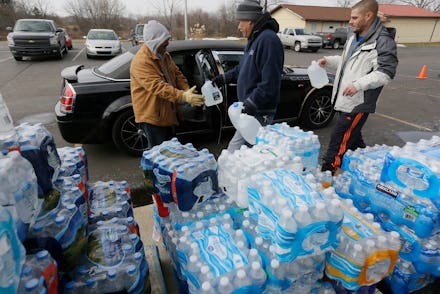Bottled Water Donations in Flint, Michigan Have Plummeted, But Crisis Remains

Months after massive water contamination in the city of Flint, Michigan drew national headlines, residents in the area are still relying on bottled water — but donations of purified, filtered water have plummeted.
At the peak of donations, Food Bank of Eastern Michigan president Bill Kerr told ABC 12, the organization was sending out up to 50 semi-trailer trucks a day. Now it's sending an average of seven.
"You know, we're not at the peak of the media's attention right now and you know, quite honestly, the water in the state it is, where the water is drinkable in Flint now as long as you use filters, there is less need in some peoples' eyes for bottled water," Kerr told the station. "We will continue to supply water to the community as long as it's needed."
Flint residents told ABC 12 they still don't trust municipal water supplies.
"The water's not good now," Steve Bryant said. "They're saying it's OK to drink, but it's not. No, I don't trust them. They lied before and they'd lie again."
"We have to find a good balance of letting kids be kids and not dealing with what we have to deal with as parents — of being scared of the water," Bobbie Nicks told the Detroit Free Press.
"We're going to be on bottled water until we hear different, but even then we might not trust it," Nicks added. "These are our children we got to worry about."
The water crisis has resulted in at least 315 state and federal lawsuits, targeting private engineering companies involved in managing Flint's water supply as well as state agencies and officials including the Michigan Department of Environmental Quality and Gov. Rick Snyder, Crain's Detroit Business reported.
According to the CDC, children younger than six who drank from the city's water lines while they were connected to the infamously polluted Flint River had a 46% higher chance of unsafe lead levels in their blood. Lead poisoning in children is linked to a wide range of devastating conditions, including lowered IQ, antisocial behavior, immunotoxicity and organ damage.
Inquiries into the cause of the crisis revealed state officials knew of the unsafe drinking water, as well as failed to properly treat it with chemicals that would prevent pipe corrosion in order to save money and delayed notifying the public.
While bottled water donations are already down, it may be years until Flint residents will have a safe alternative. A review by Gov. Snyder's office suggested the process of replacing the 20,000 to 25,000 suspected corroded pipes may ultimately cost at least $60 million and take up to 15 years.
Read more: